Featured News, Market News, News & Event
FROM FARMS TO THE WORLD: CAN VIETNAM’S FROZEN WATERMELON CREATE A BREAKTHROUGH?
In the context of Vietnam’s agricultural sector undergoing a strong transformation toward deep processing and smart exports, frozen watermelon is gradually asserting its position as one of the most promising key products. Beyond addressing seasonal and surplus output challenges, the export of frozen watermelon also creates high added value and opens up opportunities for Vietnamese fruits to penetrate deeper into the global food supply chain.
On this journey, HungHau Foods, one of the leading enterprises in the frozen food processing industry, has been introducing Vietnamese IQF watermelon to the global food map.
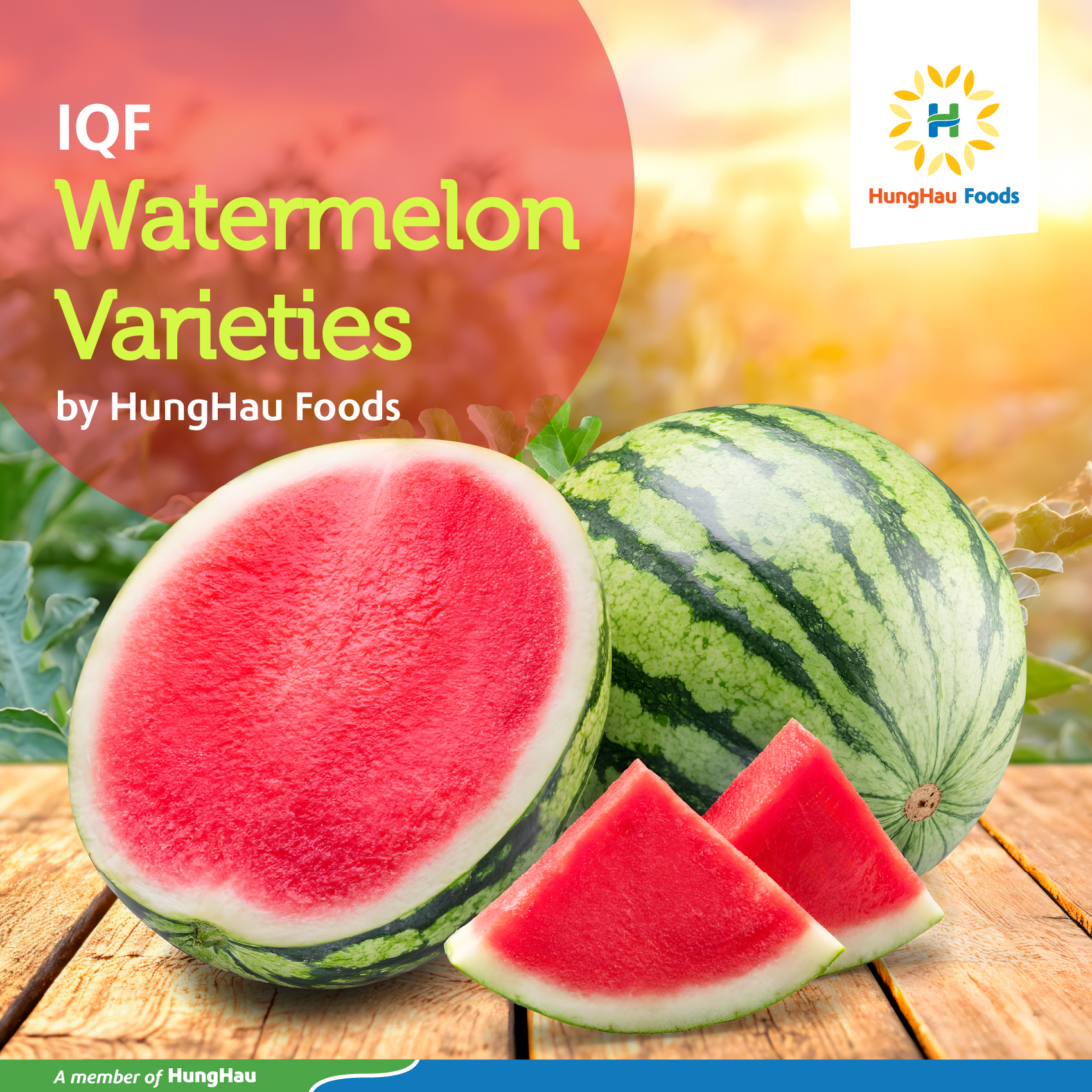
The Global Watermelon Export Landscape
China, Mexico, Spain, and Thailand are among the world’s leading watermelon exporters. China, in particular, dominates not only in production volume but also through large-scale cultivation, strong agricultural support policies, and a modern distribution system.
Common Characteristics of Major Watermelon-Exporting Countries
- Strategic investment in farming areas and quality standardization
These countries focus heavily on developing standardized growing regions with strict control from seed selection, fertilizer use, and cultivation to harvesting. This is an area where Vietnam has strong potential but has yet to fully leverage it. Many watermelon growing areas in Vietnam remain small-scale, fragmented, and lack comprehensive planning or international certifications. Vietnam needs to soon establish standardized or equivalent watermelon production zones dedicated to processing and export. - Application of modern preservation and processing technologies
Thailand and Spain have made significant investments in technologies such as freeze-drying, IQF (Individual Quick Freezing), and modified-atmosphere packaging, which help extend shelf life and maintain product quality during export.Meanwhile, Vietnam’s deep-processing rate for watermelon remains low, with most exports still in the form of fresh fruit. This presents a major opportunity for Vietnamese enterprises including HungHau Foods, one of the country’s leading agricultural exporters to accelerate the development of frozen watermelon products, thereby increasing value and reducing seasonal risks. - Sustainable Value Chain Linkage: Farmers – Processing Plants – Global Markets Leading watermelon-exporting countries have established strong, transparent, and mutually beneficial linkages between production, processing, and distribution systems — ensuring that farmers directly benefit. In contrast, Vietnam’s current linkage model remains fragmented and heavily dependent on middlemen, resulting in unstable pricing and uncertain market access.
Pricing Strategy and Supply Chain for Watermelon Exports
Countries with effective watermelon export strategies have developed closed value chains, ranging from standardized farming zones to modern pre-processing, packaging, and cold logistics systems. This ensures consistent quality and significantly reduces post-harvest losses.
Pricing strategies are flexibly adjusted based on seasonal fluctuations, market segmentation, and trade advantages under FTAs (Free Trade Agreements) to optimize costs. Many countries also provide price subsidies and agricultural insurance to stabilize market output and reduce risks for farmers.
For Vietnam, it is crucial to strengthen linkages between raw material regions, modern processing enterprises, and logistics providers, while investing in preservation technology, traceability systems, and building a national watermelon brand to enhance export competitiveness.
Vietnam’s Advantages — Untapped Potential in Watermelon Exports
- Favorable natural conditions
Vietnam’s tropical monsoon climate, abundant rainfall, and diverse soil types create ideal conditions for watermelon cultivation. As a result, Vietnamese watermelons are known for their rich sweetness, vibrant color, crisp texture, and juiciness — all highly favored by international markets, particularly in Asia, the Middle East, and Europe. These advantages form a solid foundation for expanding both fresh and frozen watermelon exports. - Year-round abundant supply
Watermelon is among the most widely cultivated fruits in Vietnam, grown across regions such as the Mekong Delta, Central Highlands, and South Central Coast. With diverse cropping seasons, farmers can rotate production to ensure a consistent supply. This provides a stable foundation for fruit processing and frozen export operations throughout the year, unlike in some countries where production is seasonal or interrupted. - Competitive production costs
Another key advantage for Vietnam lies in its affordable labor costs, enabling local enterprises to maintain more competitive product pricing compared to many other exporting nations. Amid rising global raw material and logistics costs, this cost efficiency strengthens the competitiveness of Vietnamese IQF watermelon in international markets. - Participation of professional processing enterprises
Leading companies such as HungHau Foods are at the forefront of transforming and elevating the value of Vietnamese watermelon. With state-of-the-art frozen fruit processing plants meeting international standards (BRCGS, HACCP, HALAL, etc.) and an extensive linked raw material network, HungHau Foods ensures product consistency and compliance with the strict requirements of premium markets. This demonstrates that Vietnam is fully capable of competing in the global watermelon export sector.
Challenges and Barriers
- Dependence on traditional markets
Currently, a large portion of Vietnam’s fresh watermelon exports still relies heavily on the Chinese market, through both unofficial and unstable official trade channels. This overdependence exposes farmers and exporters to risks from policy shifts, exchange rate fluctuations, and quarantine regulations. Reducing reliance on a single market is crucial to building long-term stability. - Post-harvest and cold-chain limitations
A major challenge lies in the lack of sufficient investment in post-harvest infrastructure, including cold storage, refrigerated transportation, and pre-processing preservation technologies. As a result, watermelon spoilage and quality degradation remain common, directly affecting raw material input for factories and reducing the final export value. - Lack of international certifications in small-scale farming areas
Many of Vietnam’s watermelon-growing regions are still fragmented and small-scale, with limited quality control. The absence of international certifications such as BRCGS, HACCP, SMETA, etc., makes it difficult for Vietnamese watermelon to penetrate high-end markets like Europe, Japan, and South Korea. This highlights the urgent need to standardize and plan certified growing areas for each type of raw material to strengthen export readiness.
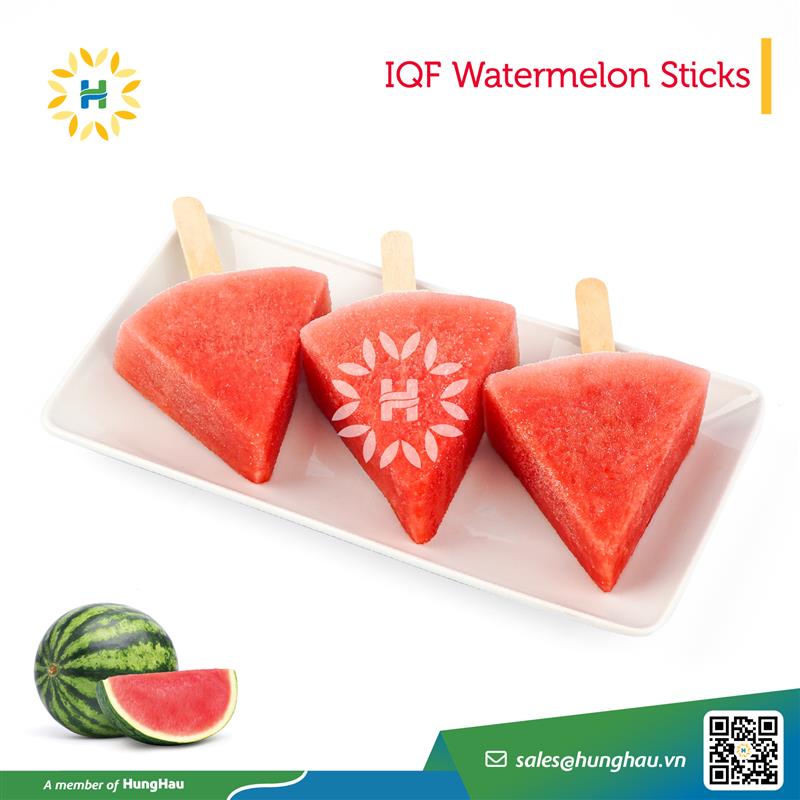
4. Untapped Potential of IQF Technology
Although Vietnam already has modern factories applying IQF (Individual Quick Freezing) technology, the scale of utilization remains modest. Many localities still lack sufficient deep-processing facilities, leading to an oversupply of raw materials during harvest seasons that cannot be efficiently used for year-round exports. Expanding and synchronizing IQF processing systems — particularly for products such as frozen watermelon — will be a strategic step toward elevating the value and global competitiveness of Vietnamese agricultural products.
HungHau Foods Frozen Watermelon – A Product of Technology and Modern Consumer Trends
As global consumers increasingly prioritize convenient, safe, and nutrient-preserving foods, IQF frozen watermelon has become an increasingly popular choice. More than just an advancement in preservation technology, frozen watermelon represents a value-adding solution for Vietnamese agriculture — extending product shelf life and opening broader export opportunities.
What Is IQF Watermelon?
IQF watermelon is made from fresh fruit that is cut into small pieces, cubes, or balls according to standard sizes and then rapidly frozen at -40°C to preserve its natural color, flavor, texture, and nutrients.
Thanks to the ultra-fast freezing process, water molecules do not form large ice crystals, ensuring that the watermelon pieces remain firm and intact after thawing.
HungHau Foods’ Frozen Watermelon Processing Procedure
- Selection of premium-quality fruit:
Only fully ripe, high-sugar watermelons with vibrant color and no bruises or disease are chosen for IQF processing. - Cleaning, peeling, and cutting:
The selected watermelons are washed on automated production lines, then peeled, de-seeded (if required), and cut into cubes, blocks, or round pieces depending on market demand. - IQF rapid freezing:
The prepared watermelon pieces are passed through the IQF tunnel freezer at -40°C for a short period, effectively “locking in” the fruit’s nutrients and natural structure. - Vacuum packaging and cold-chain logistics:
After freezing, the product is packed in specialized vacuum-sealed packaging to minimize oxidation and extend shelf life. It is then stored in cold storage at -18°C to -25°C and distributed via cold-chain logistics to both domestic and international markets.
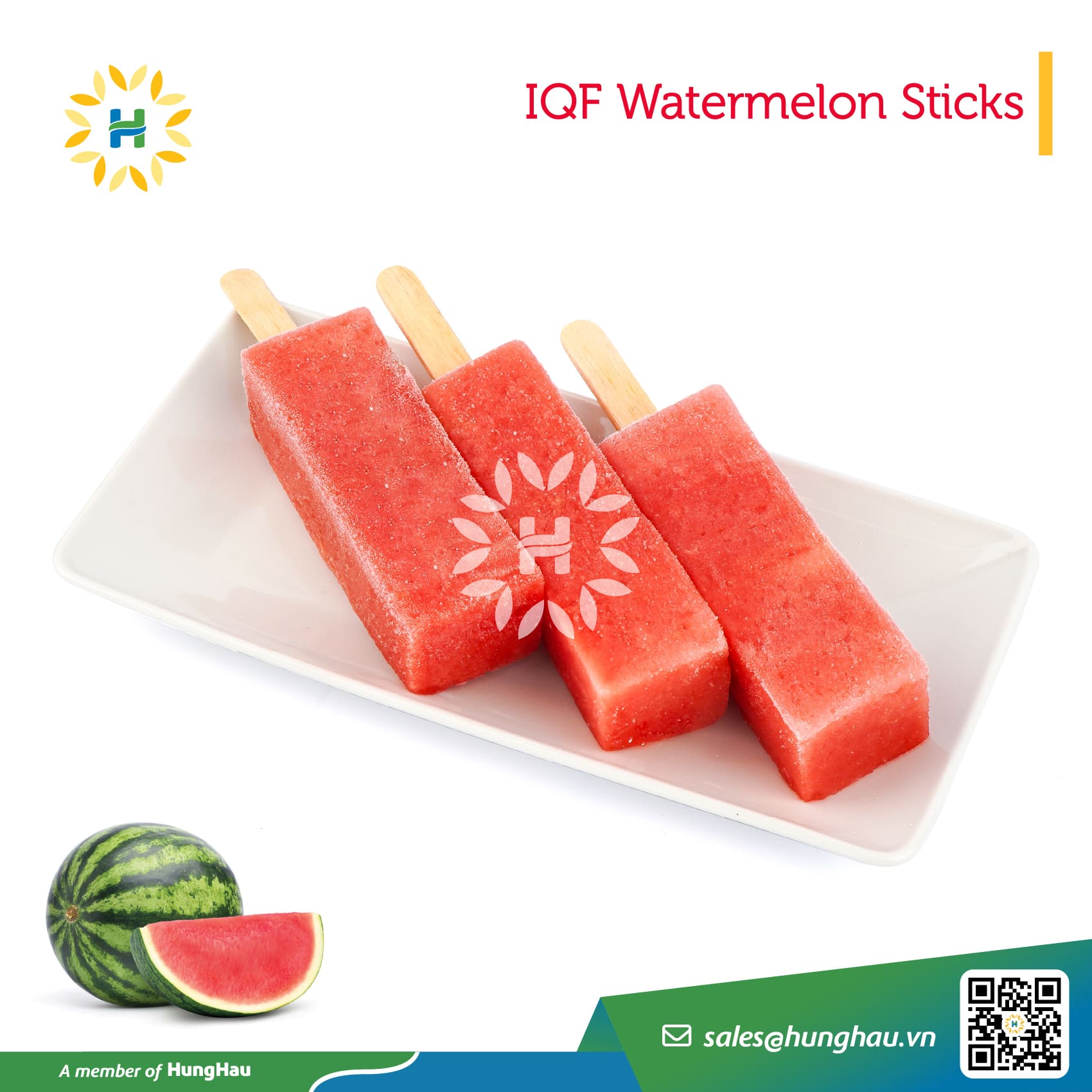
Why Is IQF Watermelon Gaining Popularity in Global Markets?
In recent years, IQF (Individually Quick Frozen) watermelon has become increasingly popular in international markets thanks to its outstanding advantages in quality, convenience, and alignment with modern consumption trends. Below are the key reasons why this product has become a preferred choice for many importers and consumers worldwide:
- Year-round availability — not limited by harvest season
One of the greatest advantages of IQF watermelon is its ability to be stored long-term without losing its natural flavor. Thanks to rapid freezing technology, the fruit can be harvested at peak ripeness and supplied to global markets at any time of the year. This allows supermarkets, restaurants, and distributors to maintain a stable and flexible supply without worrying about seasonal fluctuations. - Preserves natural flavor and nutritional value
The IQF freezing process at -40°C for a short duration effectively “locks in” the fruit’s nutrients, color, and natural texture. Without the need for preservatives or additives, IQF watermelon retains its refreshing sweetness, gentle aroma, and crisp texture, meeting the growing global demand for clean, healthy, and natural food products. - Convenient and versatile for food and beverage applications
IQF watermelon serves as an ideal ingredient for a wide range of dishes and beverages — including smoothies, juices, fruit teas, salads, ice cream, dessert toppings, or as a ready-to-use ingredient in restaurants, hotels, and buffets. Its high level of convenience — no peeling, no waste, no prep required — makes it a preferred choice for chefs, F&B chains, and major supermarket systems worldwide. - Reducing Food Waste – Optimizing the Supply ChainBy being frozen immediately after harvest and processing, IQF watermelon helps minimize spoilage, bruising, and waste — common issues with fresh produce during long-distance transportation. Additionally, cold storage and vacuum packaging make it easier to store, transport, and distribute the product efficiently, helping optimize the supply chain and reduce logistics costs for importers and distributors.
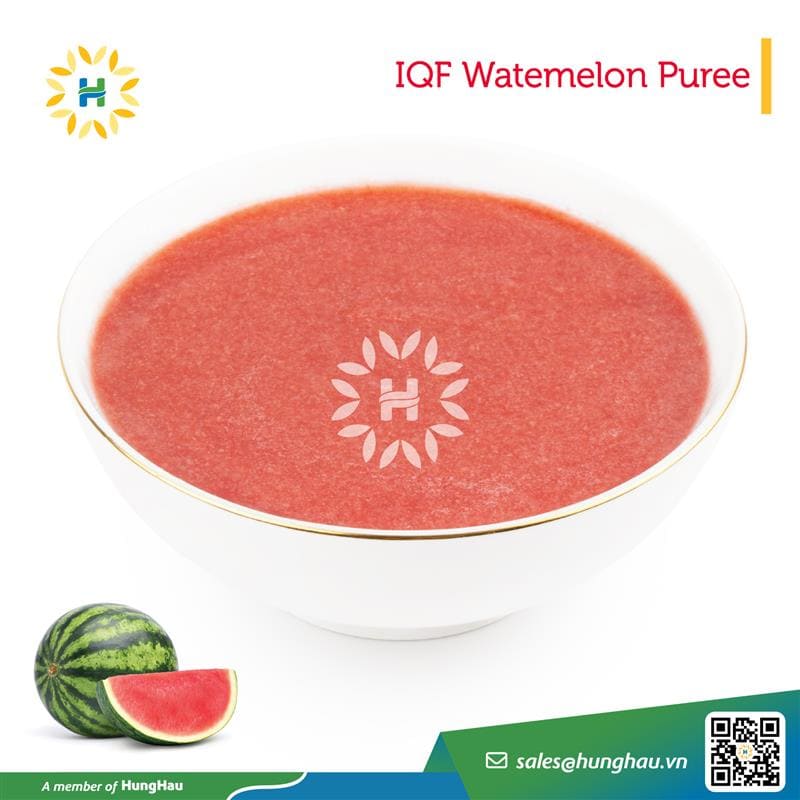
Leading IQF Frozen Watermelon Exporters in Vietnam
| Company | Raw Material Region / Processing Plant | Main Export Markets |
| HungHau Foods | Mekong Delta / Factory in Dong Thap Province | Over 80 countries and territories |
| TS Food Co., Ltd | Lam Dong, Gia Lai, Dak Lak | United States, EU, and other export markets |
| HTK Food Co., Ltd | Ho Chi Minh City, Long An, Vinh Long | Diverse markets, especially across Asia |
In Vietnam, not every enterprise possesses the technical capacity, facilities, and international certifications required to process and export frozen watermelon under strict hygiene and preservation standards. Among the few pioneers in this field, HungHau Foods stands out as a leading producer thanks to its large-scale operations, certified farming areas, and modern processing plants meeting global standards such as BRCGS, HACCP, HALAL, FDA, ISO, Kosher, and SMETA.
With its integrated supply chain from raw material zones to advanced IQF production lines HungHau Foods continues to affirm its position as one of Vietnam’s top exporters of frozen agricultural products, bringing the freshness of Vietnamese watermelon to dining tables around the world.
HungHau Foods also builds a closed value chain from farms to finished IQF products, ensuring stable quality, large output, and clear traceability. This is a key competitive advantage that helps Vietnamese IQF watermelon gradually assert its position in the global market.
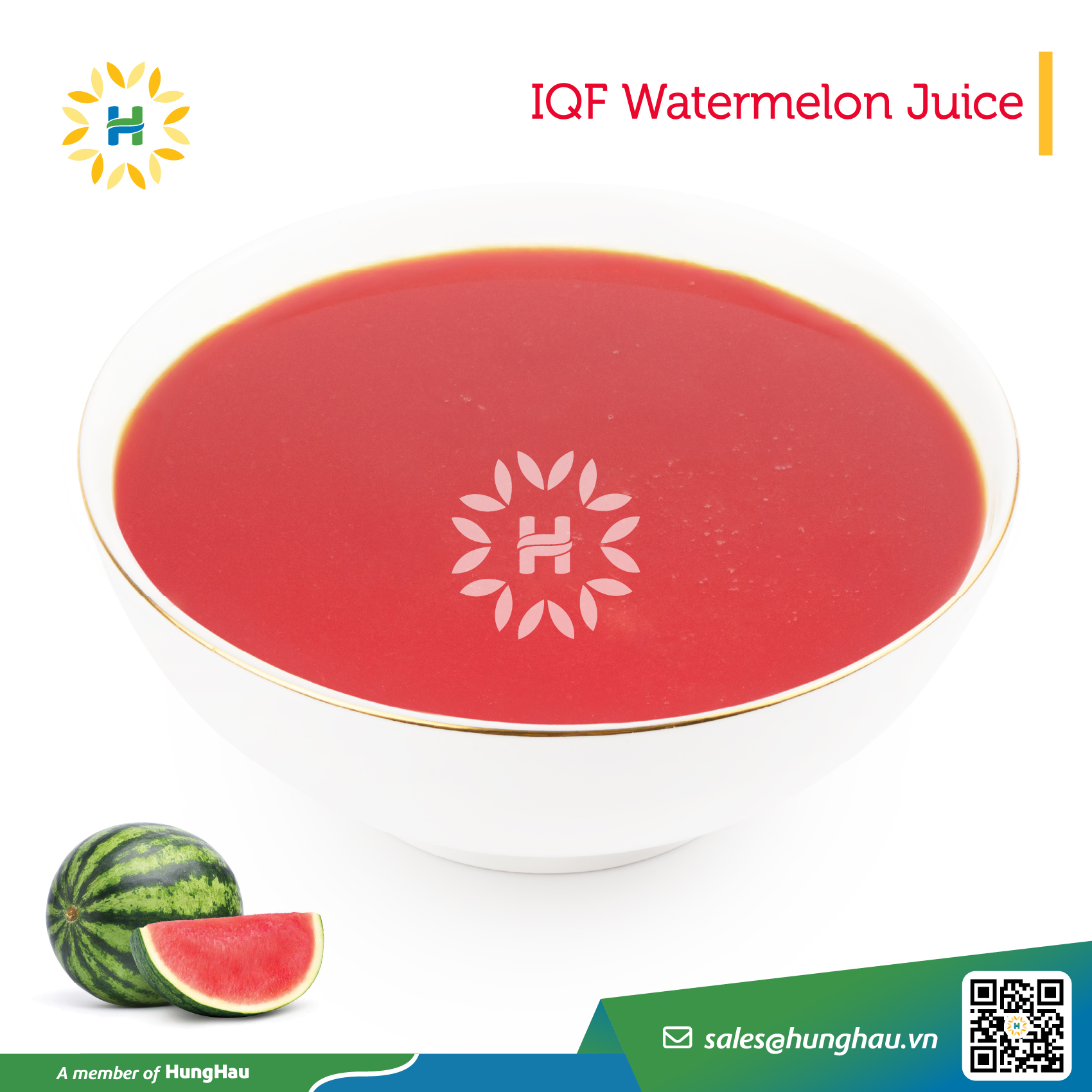
HungHau Foods – Agricultural Exporter
Strategic Vision Through Deep Processing
From the very beginning, HungHau Foods has recognized that the sustainable development and export value enhancement of Vietnamese agricultural products lie in deep processing investment. Beyond traditional fresh produce, the company has pioneered the application of modern technology to create value-added product lines, with IQF frozen watermelon being one of the highlights.
With a clear strategic vision, HungHau has made systematic investments in internationally certified processing plants, standardized farming areas, and strictly controlled production processes. The IQF watermelon not only helps solve seasonality challenges, enhances preservation and transportation efficiency, but also opens doors for Vietnamese products to enter demanding markets.
Integrated Ecosystem: Products – Factories – Raw Material Areas
To achieve sustainable growth and global competitiveness, HungHau Foods has established an integrated ecosystem from raw material sourcing to final products. The company develops standardized watermelon farming areas, working directly with farmers in the Mekong Delta and Southeast provinces. This model ensures stable output and strict quality control right from the source.
In addition, HungHau’s modern fruit freezing factories are fully equipped and certified by international standards such as BRCGS, HACCP, HALAL, and ISO 22000, meeting stringent global food safety requirements. The company’s IQF watermelon products are processed in various cuts and sizes, tailored to meet the specific needs of different markets – from retail supermarkets and fine dining restaurants to global F&B chains.
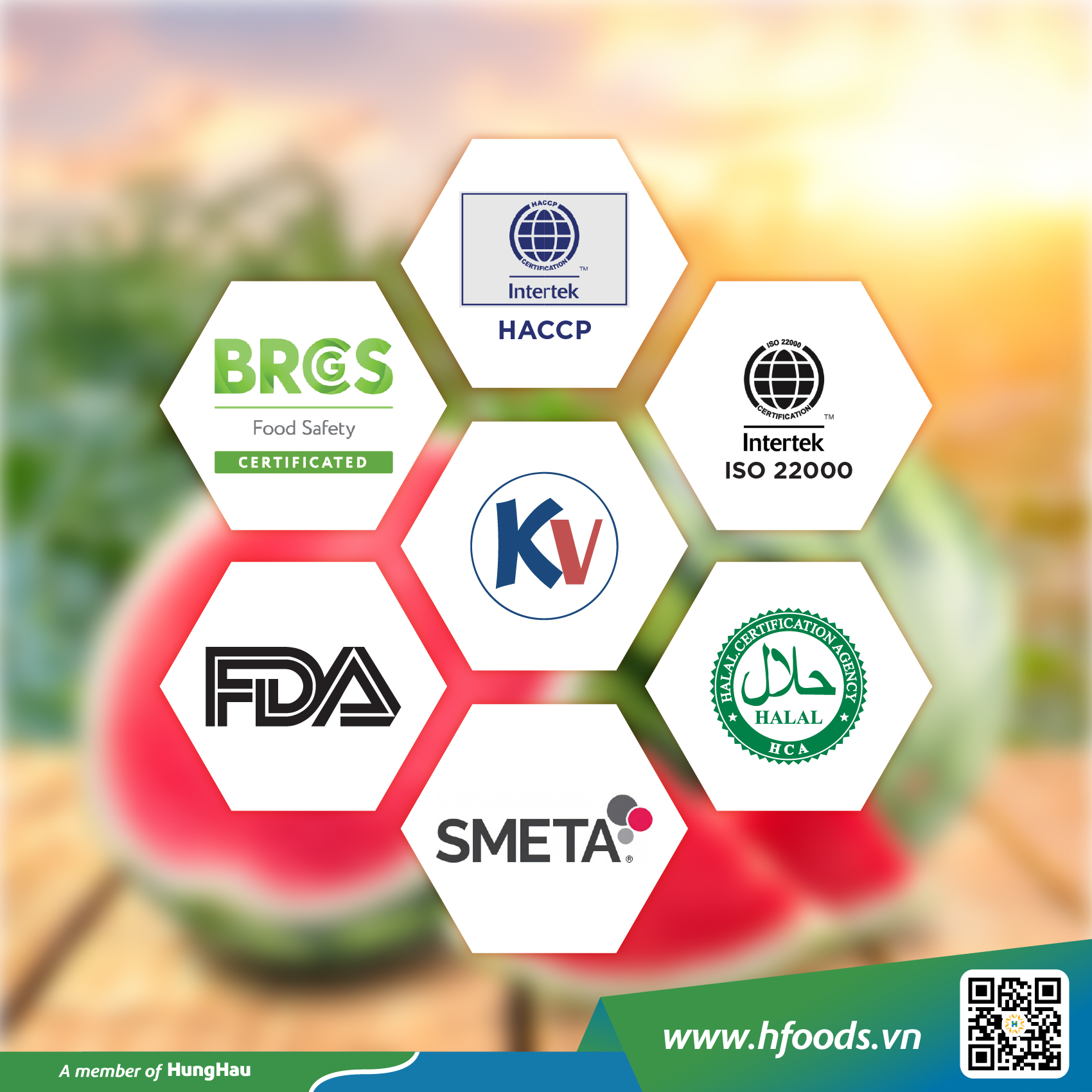
Frozen watermelon, along with other key products of HungHau Foods, not only offers competitive pricing but also comes with dedicated customer service.
With a professional sales team, HungHau Foods provides not only high-quality products but also comprehensive export support from contract consultation and packaging design to ensuring compliance with international standards. This is why HungHau Foods has become a trusted partner in both domestic and international markets.
HungHau Foods’ frozen watermelon is one of the products that helps enhance the value of Vietnamese agricultural produce. Together with other domestic enterprises, the company is actively promoting the export of IQF agricultural products a key driver for the growth of Vietnam’s food processing industry.
Contact Us:
Email: sales@hunghau.vn
Email: hana@hunghau.vn
Hotline: (+84)79 721 3333
Email: yenn@hunghau.vn
Hotline: (+84)78 520 3333
Website: www.hfoods.vn
Reference link
Top 10 thị trường xuất khẩu lớn nhất của Việt Nam (Quý 1/ 2025)
